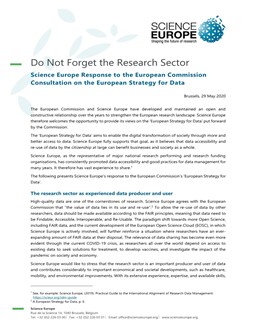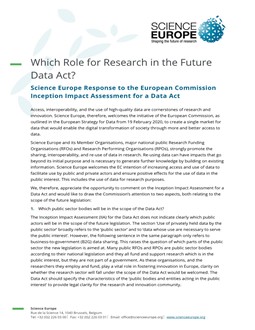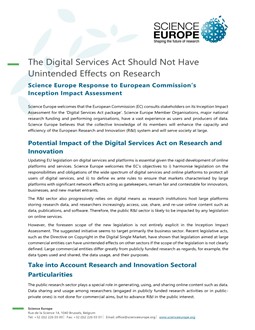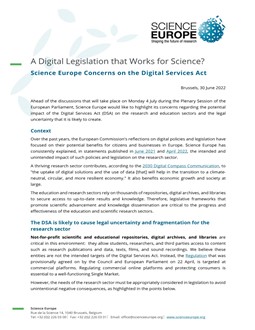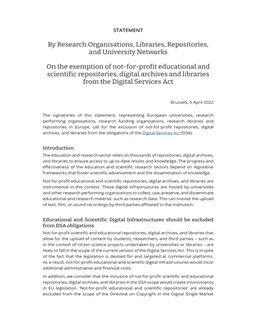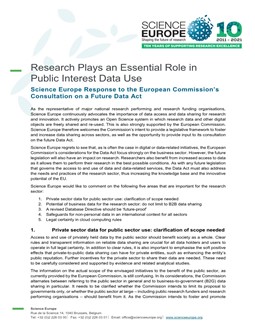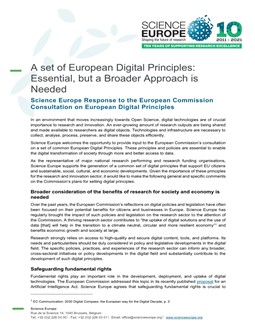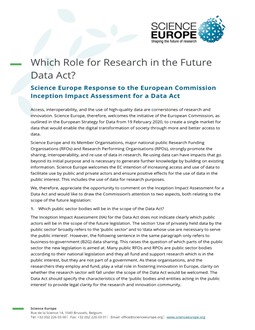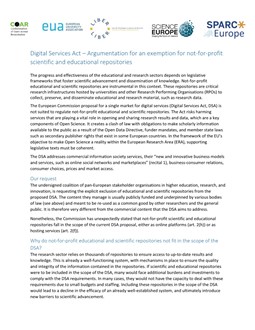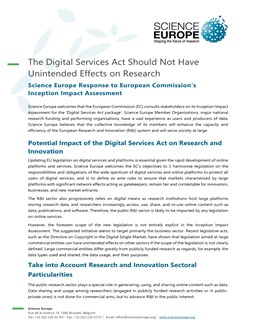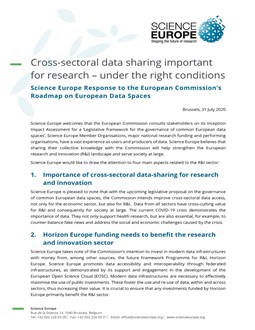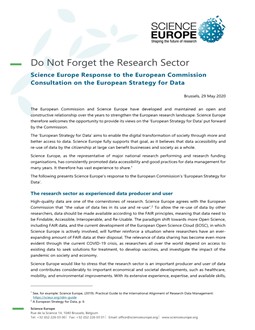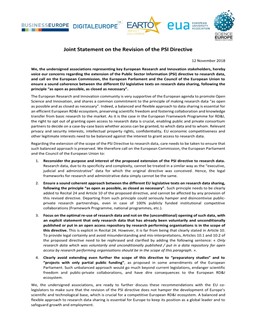Member-only content is available on this page. Please log in to view this content.

Data-related Legislation
Data are a cornerstone of the research process. The European Commission has introduced numerous pieces of data-related legislation to make more data available for Research and Innovation (R&I) and regulate their use. Science Europe follows these developments closely to ensure the best possible conditions for research.
Why does legislation on data matter for research?
Sharing and re-using data are seen as good scientific practice. The European Strategy for Data, published by the European Commission (EC) in February 2020, foresees a comprehensive approach to foster data sharing across sectors and make more data available for R&I. This approach will translate into different legislative proposals and initiatives that can impact researchers and research organisations.
European Strategy for Data
Science Europe closely follows the plans of the European Commission and has provided feedback on its data strategy to ensure it reflects the needs of the scientific community:
- Science Europe fully supports the digital transformation of society through more and better access to data. Data accessibility and re-use can benefit businesses and society as a whole.
- The research sector is an experienced user and producer of data. With its extensive experience, expertise, and available skills it can substantially contribute to the development of data policies.
- While an overarching strategy on data is welcome, well-functioning policies in the research sector should be taken into account.

European Data Spaces
The European Commission intends to develop sectoral data spaces in strategic areas such as health, mobility, and agriculture. Cross-sectoral actions are meant to link these different spaces to create a European data space. Science Europe:
- welcomes the commitment to facilitate cross-sectoral access to data;
- strongly supports the development of the European Open Science Cloud (EOSC) as a data space for research. Key principles and lessons learnt in the EOSC development can inform the development of other sectoral data spaces;
- stresses the importance of defining appropriate rules and standards for access, use, interoperability, and re-use of data;
- wants to ensure interoperability among data spaces without relaxing sectoral data-sharing standards.
Regulation on Data Governance
To provide a legal basis for data spaces and cross-sectoral data exchange, the European Commission issued a proposal for a Regulation on data governance. It aims to increase data availability by addressing four different points:
- making public sector data available for re-use, in situations where such data is subject to the rights of others;
- data sharing amongst businesses;
- allowing personal data to be used with the help of a ‘personal data-sharing intermediary’, who is supposed to help individuals exercise their rights under the GDPR;
- allowing data sharing and use for purposes of general interest (‘data altruism’).
Science Europe monitors the legislative process closely to identify potential impact of the regulation for its members and the wider research sector.
Data Act
To complement the Regulation on Data Governance (Data Governance Act), the European Commission is currently preparing a proposal for a so-called Data Act, which is expected towards the end of 2021. With this Data Act, the EC intends to create a data economy that fosters data flows between countries and sectors. Several aspects in the planned proposal could potentially have an impact on the research sector, such as:
- Making private-sector data available for use by public sector,
- Investigating the potential benefits of B2B data sharing for the research sector,
- Revising intellectual property rights in the Database Directive,
- Providing safeguards for non-personal data in an international context,
- Establishing more competitive markets for cloud computing services.
Digital Services Act
The European Commission reacts to the rapid development of online platforms and services and strives to update existing EU legislation on digital services and platforms. The revised legislation aims to harmonise the definition of responsibilities and obligations of the wide spectrum of digital services and online platforms to protect all users of digital services. It will also aim to define rules to ensure that markets characterised by large platforms remain fair.
Science Europe has provided feedback on the EC’s plans for the updated legislation based on the needs of its members:
- Science Europe welcomes the Commission’s intention in general, but asks for a refinement of the plans.
- The foreseen scope of the new legislation is not entirely clear. Recent legislative acts, such as the Directive on Copyright in the Digital Single Market, have shown that legislation aimed at large commercial entities can have unintended effects on other sectors, such as research, if the scope of the legislation is not clearly defined.
- Science Europe calls for a clear exclusion of data users and usage for the purposes of scientific research from the scope of the Digital Services Act, to avoid unintended effects on research activities. Very strict rules that unintentionally apply to scientific data storage could hinder data access if research platforms have to cease offering specific services.
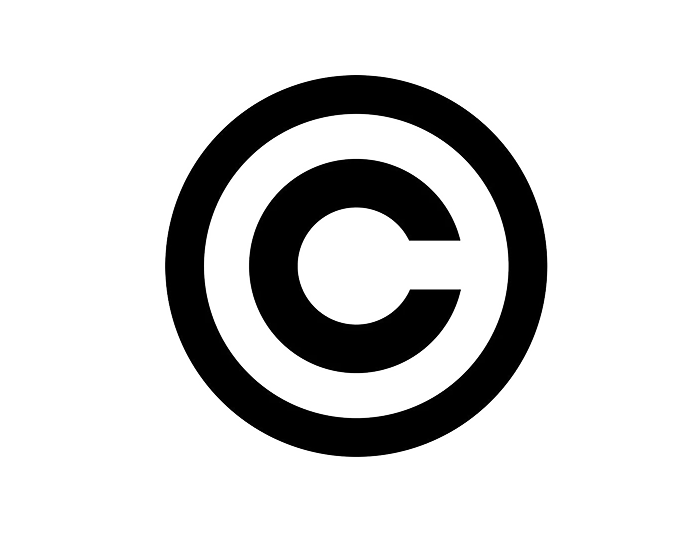
Copyright Directive (2019)
Researchers who use cutting-edge digital technologies such as text and data mining (TDM) need to be able to do so without legal uncertainty even when working in collaborative projects with private partners. Science Europe worked with its members to ensure that the European copyright legislation, adopted in 2019, took into account researchers needs.
In its September 2016 proposal for a revised Copyright Directive, the European Commission included a copyright exception for large-scale digital analysis of data by research institutions, known as TDM.
Science Europe, in collaboration with like-minded stakeholders, successfully advocated to extend this exception to include commercial entities, as in a modern research environment scientists frequently collaborate with commercial partners and the same rights must also apply to them.
Related content
A Digital Legislation That Works for Science?
Ahead of discussions on 4 July in the European Parliament, Science Europe highlights its concerns regarding the potential impact of the Digital Services Act on the research and education sectors and the legal uncertainty that it is likely to create.
Statement on the exemption of not-for-profit educational and scientific repositories, digital archives, and libraries from the Digital Services Act
Research organisations, libraries, repositories, and university networks call for the the exclusion of not-for-profit repositories, digital archives, and libraries from the obligations of the Digital Services Act.
Research Plays an Essential Role in Public Interest Data Use
Science Europe Response to the European Commission’s Consultation on a Future Data Act
A set of European Digital Principles: Essential, but a Broader Approach is Needed
Science Europe Response to the European Commission Consultation on European Digital Principles
Which Role for Research in the Future Data Act?
Science Europe Response to the European Commission Inception Impact Assessment for a Data Act.
Digital Services Act – Argumentation for an Exemption for Not-for-profit Scientific and Educational Repositories
Science Europe joins forces with other stakeholder organisations to argue for an exemption for not-for-profit scientific and educational repositories in the Digital Services Act (DSA). Please note this is for internal use only as this document was sent to a selected number of Parliament and Council representatives to advocate for the exemption.
Response to the European Commission's Inception Impact Assessment on the Digital Services Act
In its response to the European Commission, Science Europe highlights that the foreseen scope of the new legislation is not clearly defined and greater clarification should be introduced to ensure that the Digital Services Act does not have unintended effects on research.
Response to the European Commission Roadmap on European Data Spaces
In its response to the European Commission Roadmap for an upcoming legislative proposal on the governance of common European data spaces, Science Europe reinforces the need to consider sectoral policies to ensure coherence.
Response to the European Commission Consultation on the European Strategy for Data
Science Europe calls on the European Commission to take into account the important role of the research sector as producer and user of data. The longstanding experience of the research sector should feed into the development of an overarching EU data strategy that promotes data access across sectors.
In its response to the EC consultation on the European Strategy for Data, Science Europe also underlines the need to consider sectoral policies to ensure coherence between overarching and sectoral policies.
Joint Statement on the Revision of the PSI Directive
In this joint statement research and Innovation stakeholders call on the EU institutions to seek a balanced approach to data sharing in response to the European Commission’s proposal for a revision of the Directive on re-use of public sector information (PSI Directive). While the partners are supportive of the European agenda to promote Open Science and innovation, and share a common commitment to the principle of making research data ‘as open as possible and as closed as necessary’, there is a need to focus on the optimal re-use of research data and not on the (unconditional) opening of such data.

